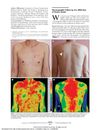 2 citations,
October 2022 in “Current Allergy and Asthma Reports”
2 citations,
October 2022 in “Current Allergy and Asthma Reports” Biologic therapies can cause various adverse events, but allergy/immunology clinicians can manage them.
1 citations,
November 2023 in “Life” Hyaluronic acid injections can improve mouth opening and quality of life in scleroderma patients.
[object Object]  1 citations,
March 2023 in “Clinical, Cosmetic and Investigational Dermatology”
1 citations,
March 2023 in “Clinical, Cosmetic and Investigational Dermatology” Current treatments for Alopecia Areata have mixed success, and there's a need for better, more accessible options and support for affected individuals.
 1 citations,
August 2022 in “Piel”
1 citations,
August 2022 in “Piel” Certain skin symptoms in COVID-19 patients may indicate a more severe illness.
 1 citations,
May 2021 in “BMC Proceedings”
1 citations,
May 2021 in “BMC Proceedings” The document concludes that more research is needed to reduce frequent hospital visits, addiction medicine education improves with specific training, early breast cancer surgery findings are emerging, nipple smears are not very accurate, surgery for older melanoma patients doesn't extend life, a genetic condition in infants can often be treated with one drug, doctors are inconsistent with blood clot medication, a certain gene may protect against cell damage, muscle gene overexpression affects many other genes, and some mitochondrial genes are less active in mice with tumors.
1 citations,
January 2021 in “Wits Journal of Clinical Medicine” Long COVID causes lasting symptoms and needs ongoing care.
1 citations,
February 2020 in “Regenerative Medicine” Significant progress and collaborations in stem cell research and regenerative medicine were made, including advancements in hair growth, cancer therapies, and treatments for neurological disorders.
 December 2024 in “Archiv Euromedica”
December 2024 in “Archiv Euromedica” Trichoscopy is essential for diagnosing and treating autoimmune cicatricial alopecia early.
December 2024 in “IntechOpen eBooks” Drug repurposing speeds up development, cuts costs, and uses known safe drugs, but faces challenges like regulations and patents.
 September 2024 in “The Italian Journal of Pediatrics/Italian journal of pediatrics”
September 2024 in “The Italian Journal of Pediatrics/Italian journal of pediatrics” COVID-19 vaccination may be linked to MIS-C in children, highlighting the need for quick diagnosis and treatment.
 February 2024 in “BMJ Open”
February 2024 in “BMJ Open” The study concluded that different treatments reduced post-COVID symptoms over time and that factors like age, severity, and comorbidities affect symptom risk.
 June 2023 in “Pharmaceuticals”
June 2023 in “Pharmaceuticals” Men and women respond differently to drugs for COVID-19, high cholesterol, and diabetes, which suggests a need for personalized treatments.
March 2023 in “Authorea (Authorea)” Early diagnosis and treatment of systemic-onset juvenile idiopathic arthritis are crucial for improvement.
 August 2022 in “IARS international research journal”
August 2022 in “IARS international research journal” The document concludes that drug repurposing, which is reusing known medicines for new illnesses, can provide faster, cheaper treatment options for various serious diseases, including cancer, COVID-19, and rare diseases.
 December 2020 in “Dermatology archives”
December 2020 in “Dermatology archives” Some COVID-19 pneumonia patients in Veracruz, Mexico, had skin issues, with reversible hair loss linked to disease severity.
 January 2017 in “Journal of Investigative Dermatology Symposium Proceedings”
January 2017 in “Journal of Investigative Dermatology Symposium Proceedings” The 2015 Hair Research Congress concluded that stem cells, maraviroc, and simvastatin could potentially treat Alopecia Areata, topical minoxidil, finasteride, and steroids could treat Frontal Fibrosing Alopecia, and PTGDR2 antagonists could also treat alopecia. They also found that low-level light therapy could help with hair loss, a robotic device could assist in hair extraction, and nutrition could aid hair growth. They suggested that Alopecia Areata is an inflammatory disorder, not a single disease, indicating a need for personalized treatments.
 21 citations,
September 2010 in “Archives of Dermatology”
21 citations,
September 2010 in “Archives of Dermatology” A woman developed psoriasis after taking certolizumab pegol, improving after stopping the drug and starting other treatments.
[object Object]  60 citations,
September 2013 in “Alimentary Pharmacology & Therapeutics”
60 citations,
September 2013 in “Alimentary Pharmacology & Therapeutics” Immunosuppressive and anti-TNF therapies in IBD patients can increase the risk of skin cancer and cause various skin issues.
 6 citations,
September 2010 in “Archives of Dermatology”
6 citations,
September 2010 in “Archives of Dermatology” Thermography matched the patient's pain levels in a shingles case and might help diagnose shingles without a rash.

COVID-19 can cause significant hair loss.

A girl with Crohn's disease developed hair loss due to her increased medication, a rare side effect seen in some children.
















